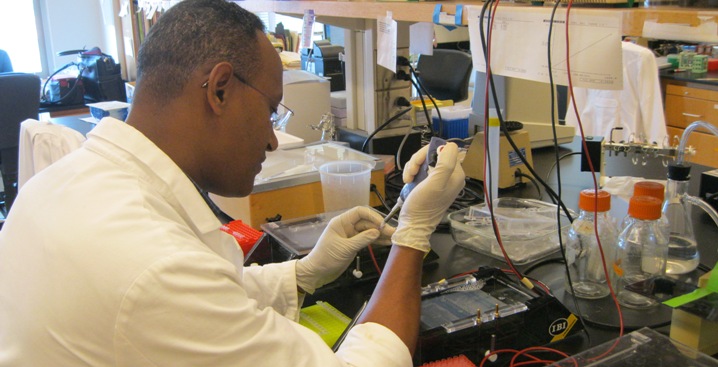
Investigations in our laboratory consist of multiple topics using a variety of methods. One example is our search for genetic factors that might "modify" ALS disease activity. Here we are comparing DNA, RNA, and protein expression from people with early vs. late onset disease and slowly progressive vs. rapidly progressive disease. We are also searching the genes of people who are healthy and do not have ALS, but who carry a genetic mutation that typically causes ALS. Why are they "resisting" the onset of disease? Another example is the discovery of "cryptic exons", which are pieces of RNA that normally are not made into protein, but in the context of ALS are "released" to make small pieces of protein (called cryptic peptides). These peptides, if they can be measured, will provide an important biomarker of ALS pathology that might be used for diagnosis, prognosis, or even measures of disease activity during clinical trials. There are several other projects underway using the techniques of genomics, proteomics, cell modeling, and even the creation of animal models.
Some New Projects:
- In collaboration with investigators at the University of Massachusetts and the NIH, and funded by ALSA, Dr. Glass is working on generating a repository of whole genome sequences collected from ALS patients around the world. This will be a valuable collection of genetic information unprecedented in size and will be made available to any and all investigators who are studying any aspect of ALS.
- The Emory ALS Center is continuing the Biomarkers Study, funded by the NIH. This project, in collaboration with investigators at the Mayo Clinic, Johns Hopkins, and the Massachusetts General Hospital will use animal models and human tissues to identify causative factors in patients with this form of genetic ALS. It is open to anyone with a potential to carry a gene mutation.
Our Investigators:
Dr. Jonathan Glass, Director. Professor of Neurology and Pathology. Dr. Glass actively collaborates with other ALS investigators around the world on multiple projects examining ALS genetics, immunology, neuropathology, and animal and cellular models of ALS. Dr. Glass also continues his work on discovering biomarkers of ALS, which necessitates the participation of PALS and CALS. We are collecting blood and spinal fluid samples from patients for our research. Family members and non-related adults are also important participants in our studies, serving as “controls” that allow us to compare results between people living with and without ALS. Dr. Glass is also a Neuropathologist, and much of his research depends on tissue donations providing a rich source of material for investigations into the causes of ALS.
Dr. Christina Fournier, Associate Professor of Neurology. Dr. Fournier is well into her 5-year research grant from the Veterans Administration to develop a new questionnaire to measure the progression of ALS. The first phase of the project is complete with creation and validation of the Rasch-Built Overall ALS Disability Scale (ROADS), a new and improved tool for measuring the degree of disability in PALS. The ROADS is an improvement over the ALS Functional Rating Scale (ALSFRS-R), as it is shown to be more reliable and is expected to be more responsive in capturing smaller changes in disability. It is hoped that this new scale will improve the efficiency of future ALS clinical trials. You can read about ROADS and be directed to the ROADS webinar here. Many thanks to all the patients who helped by completing the questionnaire and then completing it again from home. We will now be using the ROADS along with the ALSFRS-R in our clinics to help us get a clear picture on how our patients are progressing. Additional opportunities to participate in this important research may be available at your clinic visit. Please consider participating in this important effort, as these efforts help us to design better clinical trials in the future.
Jane Bordeau, RN is our Research Director. Jane has been with us since 2010. She has been a nurse coordinator on our research team on many ALS clinical and research trials.
Ezana Assefa, PhD Student. Ezana is a new graduate student working with Dr. Glass on the question of why ALS patients are so different in their clinical characteristics. This is even true for those carrying a genetic form of the disease. Ezana has embarked on a project looking at genetic factors (i.e. genetic modifiers) that may underlie this disease heterogeneity using DNA and cells generated from skin biopsy samples from patients with genetic ALS, but with varying clinical features. Ezana is just getting started, but this promises to be an exciting project.
Most importantly, we need the partnership of our patients and their families to study and better understand this disease!
Visit these pages on our website to learn about upcoming clinical research and trials we are offering:
CLINICAL RESEARCH
CLINICAL TRIALS
HAVE YOU ENROLLED IN THE NATIONAL ALS REGISTRY??

NEALS Educational Webinars: In partnership with The ALS Association, NEALS offers live webinars for people with ALS, caregivers and the broader ALS community. Topics include updates on clinical trials, best practices for clinical care, and current research efforts in ALS causes and treatments. Our webinars also offer participants the opportunity to ask questions directly of the experts running clinical trials and conducting research activities.
View the full NEALS listing of webinars for people with ALS and caregivers.

